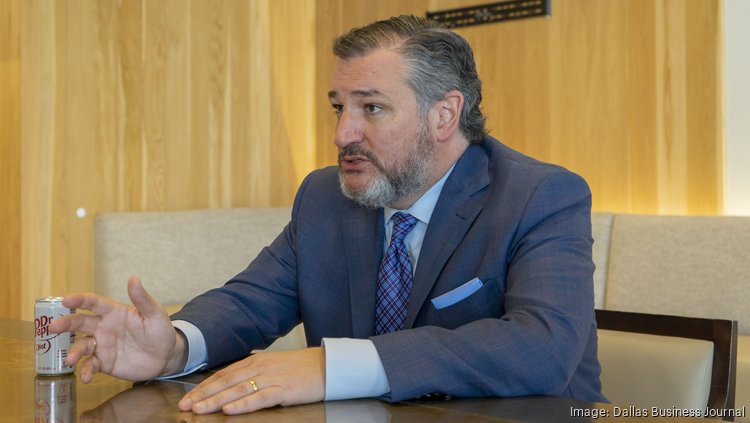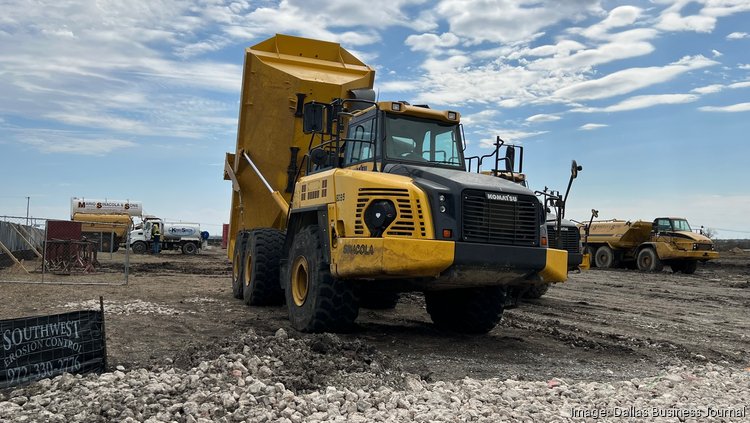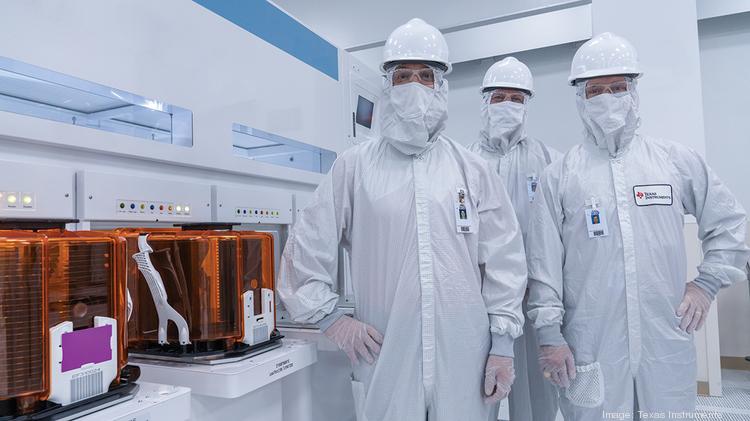U.S. Sen. Ted Cruz in a visit to Dallas renewed his call for Texas to be the site of an $11 billion center aimed at restoring the nation’s leadership in the advanced semiconductor manufacturing industry.
Tens of billions of dollars for new facilities to manufacture advanced semiconductors are being invested in Texas — mostly in North Texas and the Austin area.
Congress in August approved $53 billion for semiconductor manufacturing and research through CHIPS for America, an initiative aimed at supercharging the U.S. semiconductor industry and revitalizing the country’s innovation ecosystem. This funding includes $11 billion for research and development, the focal point of which will be the National Semiconductor Technology Center, an innovation hub planned to improve semiconductor technology and seed new industries built on the capabilities of a wide range of advanced chips.
Cruz (R-Texas), ranking member of the Senate Committee on Commerce, Science and Transportation, said he is “hopeful” that the National Semiconductor Technology Center will be built in Texas.

U.S. Sen. Ted Cruz at the AT&T headquarters in Dallas. Cruz said he is hopeful Texas will be the site of an $11 billion center aimed at restoring the nation’s leadership in the advanced semiconductor manufacturing industry.
Cruz said he likes Texas’ chances of landing the massive semiconductor center if the decision by the U.S. Department of Commerce is based on the merits of the location, and not on politics.
“I think it is critically important that the tens of billions of dollars that the Biden administration is spending right now — money that Congress has already appropriated — be spent based on clear and objective criteria, on fair metrics, rather than on political patronage,” Cruz said in an exclusive interview with the Dallas Business Journal at telecom giant AT&T's headquarters in Dallas on Friday. “Those billions of dollars should not be spent based on who has a buddy of the Biden White House, but rather based on objective and fair standards. If the decisions are merit-based, I have great confidence that Texas will do very, very well.”
The center will be a public-private consortium that provides a platform where government, industry, suppliers, customers, educational institutions, entrepreneurs, workforce representatives and investors converge to address the semiconductor ecosystem’s most pressing challenges and opportunities.
“It's not complicated,” Cruz said. “The Biden White House is not terribly fond of the state of Texas. If it's simply a political decision, our chances are not nearly as good, but I'm hopeful. There is no economic engine on the planet like the state of Texas.”
Cruz said he will fight for the National Semiconductor Technology Center to be built in Texas, but he would not take a position on where in the Lone Star State it should be built.
“My responsibility and the way I approach it is I advocate for Texas and I let the individual regions make their relative arguments vis-à-vis the other regions,” he said. “I assiduously avoid picking sides between any region in Texas because you can't do your job representing the entire state if you're playing favorites. What I do instead is advocate for the state across the board and make the case that any of the regions would be better than an option outside of Texas.”

Equipment at the Texas Instruments chip fabrication site under construction in Sherman.
The center will develop a comprehensive semiconductor research and development program that will include research, prototyping capabilities, an investment fund and workforce development programs.
Advanced semiconductor manufacturing plays a large and growing role in the North Texas economy.
In May 2022, Dallas-based Texas Instruments (Nasdaq: TI) broke ground on the first fabrication plant in Sherman, 65 miles north of Dallas, in what's expected to be a $30 billion, four-factory semiconductor manufacturing campus. At full buildout, TI’s Sherman campus is expected to be the biggest electronics production facility in Texas and among the largest manufacturing facilities in the country. About 4,000 new jobs are set to be created with the TI expansion, generating billions of dollars to the Grayson County economy.
TI last year kicked off production in a similar wafer fab facility in Richardson.

Employees in RFAB2 in Richardson. Initial production has begun in Texas Instrument's third and largest 300-millimeter wafer fab.
Also in Sherman, GlobiTech, a subsidiary of Taiwan-based GlobalWafers Co., is building a $5 billion semiconductor manufacturing plant expected to bring 1,500 jobs.
In addition, South Korea's Samsung Electronics has a big presence in Central Texas and plans to expand with a $17 billion chip manufacturing plant north of Austin in Taylor, Texas, and potentially up to 11 semiconductor facilities in and around Austin.
Texas Gov. Greg Abbott has pushed to bring federally funded semiconductor research and development to Texas through the creation in October 2021 of the National Semiconductor Centers Texas Task Force. The goal of the task force is to convince the U.S. Department of Commerce to select Texas as the site of the National Semiconductor Technology Center and another research center called the National Advanced Packaging Manufacturing Program.
Abbott and the state’s economic development community have been working to elevate Texas as a hub of semiconductor manufacturing activity to rival chip production in other countries.
Making advanced semiconductors in the U.S. is critical for national security in addition to being an economic issue, Cruz said in the interview with the Business Journal.
"Right now, we are enormously dependent on foreign development of advanced semiconductors, and in particular, we are enormously dependent upon Taiwan,” he said. “In today's foreign policy context, Taiwan is in significant jeopardy from Chinese aggression, and I can tell you when our military engages in war games of dangerous potential developments, there's no scenario more dangerous or more central to their planning right now than how to respond if China moves militarily on Taiwan.”
If China were to invade and take over Taiwan, as Chinese President Xi Jinping has stated he wants to do, “it would place the United States in an enormously vulnerable position because we are dependent upon Taiwanese chips for an enormous percentage of our electronics in our cell phones, in our automobiles, in our airplanes, in our missiles and defense equipment,” Cruz said.
“That vulnerability is profound, not just from an economic perspective, where it is massive, but also from a national security perspective,” he said. “We cannot responsibly allow the United States to be in that kind of jeopardy.”
Tens of billions of dollars for new facilities to manufacture advanced semiconductors are being invested in Texas — mostly in North Texas and the Austin area.
Congress in August approved $53 billion for semiconductor manufacturing and research through CHIPS for America, an initiative aimed at supercharging the U.S. semiconductor industry and revitalizing the country’s innovation ecosystem. This funding includes $11 billion for research and development, the focal point of which will be the National Semiconductor Technology Center, an innovation hub planned to improve semiconductor technology and seed new industries built on the capabilities of a wide range of advanced chips.
Cruz (R-Texas), ranking member of the Senate Committee on Commerce, Science and Transportation, said he is “hopeful” that the National Semiconductor Technology Center will be built in Texas.

U.S. Sen. Ted Cruz at the AT&T headquarters in Dallas. Cruz said he is hopeful Texas will be the site of an $11 billion center aimed at restoring the nation’s leadership in the advanced semiconductor manufacturing industry.
Cruz said he likes Texas’ chances of landing the massive semiconductor center if the decision by the U.S. Department of Commerce is based on the merits of the location, and not on politics.
“I think it is critically important that the tens of billions of dollars that the Biden administration is spending right now — money that Congress has already appropriated — be spent based on clear and objective criteria, on fair metrics, rather than on political patronage,” Cruz said in an exclusive interview with the Dallas Business Journal at telecom giant AT&T's headquarters in Dallas on Friday. “Those billions of dollars should not be spent based on who has a buddy of the Biden White House, but rather based on objective and fair standards. If the decisions are merit-based, I have great confidence that Texas will do very, very well.”
The center will be a public-private consortium that provides a platform where government, industry, suppliers, customers, educational institutions, entrepreneurs, workforce representatives and investors converge to address the semiconductor ecosystem’s most pressing challenges and opportunities.
“It's not complicated,” Cruz said. “The Biden White House is not terribly fond of the state of Texas. If it's simply a political decision, our chances are not nearly as good, but I'm hopeful. There is no economic engine on the planet like the state of Texas.”
Cruz said he will fight for the National Semiconductor Technology Center to be built in Texas, but he would not take a position on where in the Lone Star State it should be built.
“My responsibility and the way I approach it is I advocate for Texas and I let the individual regions make their relative arguments vis-à-vis the other regions,” he said. “I assiduously avoid picking sides between any region in Texas because you can't do your job representing the entire state if you're playing favorites. What I do instead is advocate for the state across the board and make the case that any of the regions would be better than an option outside of Texas.”

Equipment at the Texas Instruments chip fabrication site under construction in Sherman.
The center will develop a comprehensive semiconductor research and development program that will include research, prototyping capabilities, an investment fund and workforce development programs.
Advanced semiconductor manufacturing plays a large and growing role in the North Texas economy.
In May 2022, Dallas-based Texas Instruments (Nasdaq: TI) broke ground on the first fabrication plant in Sherman, 65 miles north of Dallas, in what's expected to be a $30 billion, four-factory semiconductor manufacturing campus. At full buildout, TI’s Sherman campus is expected to be the biggest electronics production facility in Texas and among the largest manufacturing facilities in the country. About 4,000 new jobs are set to be created with the TI expansion, generating billions of dollars to the Grayson County economy.
TI last year kicked off production in a similar wafer fab facility in Richardson.
Texas Instrument wafer fabs in Richardson

Employees in RFAB2 in Richardson. Initial production has begun in Texas Instrument's third and largest 300-millimeter wafer fab.
Also in Sherman, GlobiTech, a subsidiary of Taiwan-based GlobalWafers Co., is building a $5 billion semiconductor manufacturing plant expected to bring 1,500 jobs.
In addition, South Korea's Samsung Electronics has a big presence in Central Texas and plans to expand with a $17 billion chip manufacturing plant north of Austin in Taylor, Texas, and potentially up to 11 semiconductor facilities in and around Austin.
Texas Gov. Greg Abbott has pushed to bring federally funded semiconductor research and development to Texas through the creation in October 2021 of the National Semiconductor Centers Texas Task Force. The goal of the task force is to convince the U.S. Department of Commerce to select Texas as the site of the National Semiconductor Technology Center and another research center called the National Advanced Packaging Manufacturing Program.
Abbott and the state’s economic development community have been working to elevate Texas as a hub of semiconductor manufacturing activity to rival chip production in other countries.
Making advanced semiconductors in the U.S. is critical for national security in addition to being an economic issue, Cruz said in the interview with the Business Journal.
"Right now, we are enormously dependent on foreign development of advanced semiconductors, and in particular, we are enormously dependent upon Taiwan,” he said. “In today's foreign policy context, Taiwan is in significant jeopardy from Chinese aggression, and I can tell you when our military engages in war games of dangerous potential developments, there's no scenario more dangerous or more central to their planning right now than how to respond if China moves militarily on Taiwan.”
If China were to invade and take over Taiwan, as Chinese President Xi Jinping has stated he wants to do, “it would place the United States in an enormously vulnerable position because we are dependent upon Taiwanese chips for an enormous percentage of our electronics in our cell phones, in our automobiles, in our airplanes, in our missiles and defense equipment,” Cruz said.
“That vulnerability is profound, not just from an economic perspective, where it is massive, but also from a national security perspective,” he said. “We cannot responsibly allow the United States to be in that kind of jeopardy.”


/cloudfront-us-east-2.images.arcpublishing.com/reuters/6SGAH5M6EFKZXFQTBC4MHRBW34.jpg)
